Index relies entirely on the support of donors and readers to do its work.
Help us keep amplifying censored voices today.
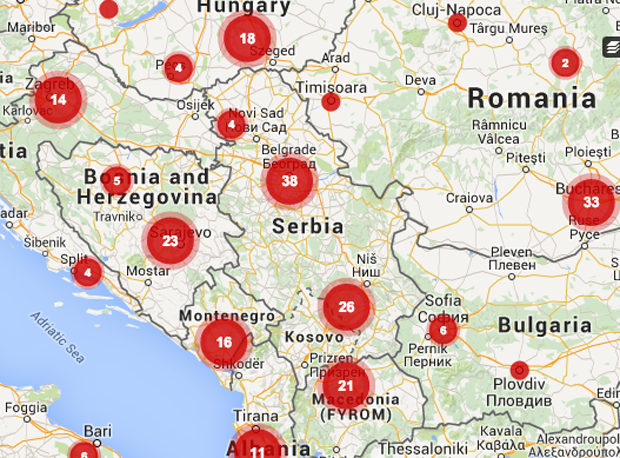
Image via mediafreedom.ushahidi.com
Working as a professional journalist in Serbia is hard. Being one in the country’s inland is even harder. Out of the 58 verified incidents involving Serbian media outlets and professionals reported to Index on Censorship’s European Union-funded Mapping Media Freedom, 30 have occurred outside Belgrade; the country’s political, economic and media capital. Four of these incidents have been directed at Juzne Vesti staff.
Launched in 2010 by journalist Predrag Blagojevic, Juzne Vesti is an independent news site based in Nis, a town of 257.000 in southern Serbia. In just over five years, its journalists have been subjected to verbal harassment or death threats 15 times. Though they have reported the incidents to local authorities, it has not resulted in convictions.
“Nobody has been found guilty and punished for the threats,” Blagojevic, who is also the site’s editor-in-chief, told Index.
According to Blagojevic, the main obstacle to punishing those threatening journalists comes from the prosecutor’s office. While he is quick to complement police in the town for their professional and timely investigations, he blames prosecutors for failing to act on the evidence by filing indictments quickly.
“In two situations from four to six months passed from the time the police filed a criminal charge to the prosecutor’s indictments,” Blagojevic explained.
Juzne Vesti correspondent Dragan Marinkovic from Leskovac received threats on Facebook after he published an article about the death of a woman, in which he questioned the treatment provided by a paramedic. He reported the incident to authorities. Several months later prosecutors decided not to pursue the case, arguing that “you deserve a bullet” is not a threat.
In March 2014 Blagojevic was threatened by the owner of a local football club, yet prosecutors waited until late September to indict the main suspect. The first court hearing was scheduled for December 2014; the next one at the end of this month.
While such delays are frustrating, once in court, judges have taken some dubious positions, Blagojevic said. In one case, the court said that “be careful what you write” or “do not play with fire” were not threats, but words that “merely showed the seriousness of the topic”. In another instance, where the perpetrator asked a Juzne Vesti staffer “Will you be alive in the morning if you wrote something like this in the USA?”, the court said that “the inductee, by placing the action in the foreign country, shows that he is aware that murder is prohibited by Serbian law”.
Outside the legal system, there is another obstacle to independent journalism in Serbia: money. While the Serbian government pays for advertising space, most of the earmarked money is directed at the national press. At the same time, the number of successful companies outside Belgrade and Novi Sad are few, and those that do thrive in the Serbian inland are usually aligned with local political figures. That leaves a tiny pool of advertisers.
“In these circumstances we are left with only very small companies, which are connected with political parties or dependent on municipal budgets. The game is straightforward — only if you are good to us you will get money,” Blagojevic said.
In an interview with SEEMO, Blagojevic described situations where certain media outlets have been financed with taxpayers’ money. With this line of funding, competing outlets are able to offer low rates that distort the advertising market, which puts pressure on independent media to drop their rates.
“The local government in Nis sets aside hundreds of millions of dinars in payment for these PR services,” Blagojevic said. The money is sometimes up to 80 per cent of the budget for these outlets making it even more difficult for independent media to compete.
The Council of Europe’s recent report on the Serbian media situation addressed the issue: “Instead of making efforts to create non-discriminatory conditions for media industry development, the state is blatantly undermining free market competition.”
The last issue confronting Juzne Vesti staff is one that will be familiar to small town journalists around the world — everyone knows everyone. Blagojevic tells of having to convince one journalist to file a complaint because she knew the person who had targeted her. She was reluctant because she had known the person “since they were kids”, he said.
From Blagojevic’s point of view, the toxic mix of money, political pressure and indifference from the courts causes self-censorship among journalists.
“The language from the 90s is back in Serbia. Again, journalists that criticise the work of the government or are reporting on corruption are labelled as foreign mercenaries. Threats like this come from the mouths of the highest state representatives,” he said.
An earlier version of this article stated that Nis has a population of 184,000. The latest census puts the figure at 257.000.
This article was posted on March 27, 2015 at indexoncensorship.org
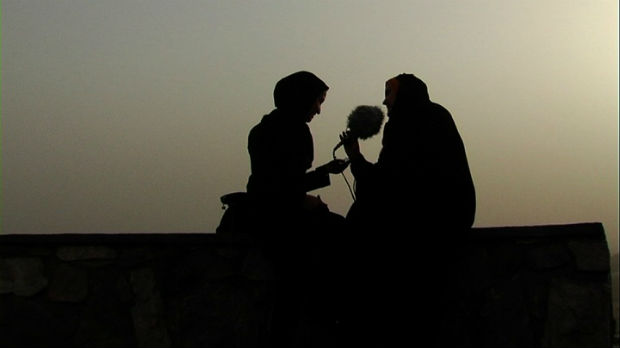
(Image: Women’s Worldwide Web)
Last year, authorities in the east of Afghanistan decided to shut down a cemetery. The problem was that this particular cemetery was not just a final resting place; it had taken on a second function as a marketplace where women in the city could meet and trade. With the closure, the financial lifeline the women had created for themselves, was cut. There were some protests, the story was covered in a local newspaper, and that was it.
Afghan media has experienced a significant growth spurt over the past years. In 2000, the country was home to 15 news outlets; in 2014 the figure was just shy of 1,000. Hidden within these numbers is another slowly expanding subcategory. Of around 12,000 working journalists in Afghanistan today, some 2,000–2,500 are women, up from an estimated 1,000 in 2006. The truly vital role these women play in Afghan society is too often overlooked.
In a country where traditional cultural norms still hold significant sway, strict limitations on contact between the sexes continue to be enforced in many areas. As a result, there are spaces only female journalists have access to, grievances only female journalists can be told and important realities of women’s lives that only female journalists can report on. Where women media workers are few and far between, such stories — like in the case of the cemetery closure — go underreported, or are buried entirely.
“Covering and focusing on women’s issues is always my favourite, and when I produce programs and make reports on these issues, I really like it and think I’ve done something important,” Radio Sahar Station Manager Humaira Habib told Index. Radio Sahar is part of Parwana (butterfly), a network of radio stations dotted around Afghanistan, which focuses on stories that impact women and their rights and needs. And from the managerial to the executive level, they are all-female operations.
Habib says she made the decision to go into journalism in 2002, and was influenced by the plight of women under the Taliban. “I thought journalism was a good tool to reach to all the aims and goals, and to solve the problems and challenges of women. I think media plays a very important role in informing citizens,” she explained. “This was the reason I decided to study journalism.”
But while the long view seems to suggest the number of Habib’s female compatriots will continue to grow, serious challenges and setbacks remain the reality in the shorter term.
Part of the problem is that the same traditional norms that make female journalist’s contribution especially valuable, still present a significant barrier to many women joining the media industry. As reporter Zarghona Salihi told Radio Free Europe/Radio Liberty, journalism is widely viewed as “immoral work” that carries with it social stigma for women.
“Parents don’t permit their daughters to become journalists [in particular] because female journalists soon turn popular and that puts them in lots of troubles,” news radio host Haseena Ahmadi told Voice of America.
Another, more direct and overt challenge is the seemingly worsening security situation for media workers in general, and the particular threats faced by women. Since 2001, 49 journalists have been killed, and attacks went up 64 per cent from 2013 to 2014, according to a recent report from Human Rights Watch. What’s more, they face a multi-pronged assault — from the government and local authorities, as well as from war lords and the Taliban. Meanwhile, impunity for such crimes persists.
Women must deal with all this, and then some. “Female journalists face particularly formidable challenges. Social and cultural restrictions limit their mobility in urban as well as rural areas, and increase their vulnerability to threats and attacks, including sexual violence,” the Human Rights Watch report states. Since 2010, three female journalists have been killed, including 26-year old Palwasha Tokhi, stabbed to death outside her house in September last year. The Afghan Journalists Safety Committee says that “dozens have been intimidated to stop working”. In 2013, Shaffiqa Habibi, director of the Afghan Women Journalist Union, estimated that 300 professional female journalists had stopped working due to safety concerns.
“The big challenge that journalists face here is the security problem. That really hurts us,” agrees Habib. In 2004 she was threatened by authorities and told she could never again work as a journalist in the western province of Herat. But she fought back, and today continues to hold a senior role at a radio station in that province. As one young journalist told International Media Support: “I have been threatened by the Taliban, corrupt authorities, warlords and even the government. But none of these threats will ever stop me from what I do.”
The struggle, however, doesn’t end by challenging traditions and braving a volatile security situation. Female journalists in Afghanistan are also facing a problem familiar to women all over the world: they’re simply not getting the chances their male counterparts are. On this point, international media has failed Afghanistan’s women reporters. While Amie Ferris-Rotman was working as Reuters’ Afghanistan correspondent, she realised that none of the foreign news outlets hired Afghan female correspondents, in any capacity.
“I found this hypocritical,” she told Index. “We put out a plethora of stories on women’s rights and the awful hurdles Afghan women face, yet we did not take the extra step to hear their stories in a professional context.”
Pointing to the continued prevalence of separation between the genders, she argues that by not giving a platform to female Afghan journalists, we are missing the full story. The journalists, meanwhile, are denied good networks and professional opportunities to further their careers. To help rectify this situation, Ferris-Rotman has set up the Sahar Speaks programme, to offer training and mentoring by peers from around the world to Afghan female journalists, with the aim of helping them produce stories to be published by international outlets. As she has written about the project: “Imagine how rich and nuanced the other side of the Afghan story can be, if told by its own women, not by Afghan men or foreign reporters.”
Abdul Mujeeb Khalvatgar, the director of media freedom advocacy group Nai, which is behind the Parwana network, believes it to be very important that Afghanistan’s female reporter pool continues to grow. Certain topics, he explains, are still considered by some to be taboo for men to cover. He mentions literacy rates among women, violations against women and how women are treated both in rural and urban areas as examples of stories that “raised the need of having women journalists to report”.
Habib stresses the importance of increasing the number of female reporters outside the bigger cities, where many women’s issues that male journalists have limited access to, go uncovered. This is a “serious problem” she says, adding that “we need to train girls from those places to at least learn basic journalism to cooperate with local and national media”.
Despite the challenges, Khalvatgar, who has been nominated for an Index award for his media freedom campaigning in Afghanistan, is confident that there is enthusiasm among women to work in the sector. He points to his experience of visiting journalism schools and seeing a higher number of female than male students, as one indicator. “There are a lot of hopes and wishes among women to become journalists,” he says.
Afghanistan’s President Ashraf Ghani vowed during his 2014 election campaign to uphold freedom of expression and protect journalists against abuse. Whether he will stick to his promise down the line, so the enthusiasm Khalvatgar speaks about can truly be harnessed, remains to be seen. What is clear, is that without more women feeling encouraged and safe enough to join Habib and her colleagues in their work, important stories will continue to go untold.
This article was posted on March 6, 2015 at indexoncensorship.org
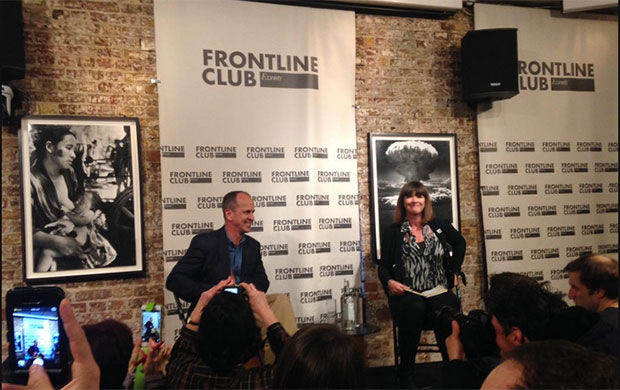
Peter Greste spoke to a Frontline Club audience about his arrest and detention in Egypt. (Photo: Milana Knezevic / Index on Censorship)
Peter Greste, the Al Jazeera journalist recently released after 400 days in Egyptian jail, met a packed room at London’s Frontline Club on Thursday, where he spoke about his time in jail, the campaign for his release and fellow journalists still imprisoned in Egypt. “An attack on journalism, an attack on freedom of speech, is an attack on the wider society,” he said.
“I remember that day well,” he said, recounting 29 December 2013, when a group of around eight men came to his Cairo hotel room and without explanation started searching it, before talking him away. While he was aware that the media was under some pressure in Egypt, the arrest came as a surprise. He felt as long as they stuck to their journalistic principles and didn’t push boundaries, they would be fine.
“There have been plenty of stories before where I’ve pushed boundaries, when I fully expected to get a knock on the door from the police, when I know I’ve upset governments,” he explained. But this time around, he hadn’t gone looking for difficult stories or made a conscious effort to try and challenge the government, so he “genuinely didn’t think it was going to be an issue.”
Greste was imprisoned together with Al Jazeera producer Baher Mohamed and Al Jazeera English’s Cairo bureau chief Mohamed Fahmy. He said they forced themselves to consider that they might be convicted, but never seriously believed it.
While there were “some very dark moments”, he insisted anger wasn’t his dominant emotion, believing that letting anger take hold of the situation would only hurt himself. They were broadly treated with respect in prison, and never physically threatened. “The problem is that in prison…what really matters is your own head, your own mind and how you cope with it.”
Egypt
Index has reported extensively on the situation confronting free expression in the country
Committee to Protect Journalists named Egypt as one of the world’s top 10 jailers of journalists in Dec 2014
Reporters Without Borders: World Press Freedom Index ranks the country as 159
Freedom House: Classifies Egypt as “not free”
Greste spoke of the importance of having a routine and some structure to his day, crediting seemingly simple things like meditation, exercise, studying and even cooking with helping him though the ordeal.
“The only way through is to set your horizon, to set a target date, to set something that’s manageable,” he said. “What you do is narrow your horizon, to the thing that you think you can cope with. Sometimes that was the end of next week, or it would be to the next visit. Sometimes it would be simply to the end of the day.”
Today, he doesn’t feel traumatised, and believes that we are all more capable of dealing with difficult situations than we think. And when discussing the conditions in prison, it was clear he had kept his humour. “The less said about the toilets the better,” he joked.
If his detention had been a surprise, so was his release. He had been expecting his brother for a visit, when he got the unexpected message to pack his bags — he was going home. Himself, Fahmy and Mohamed had discussed the possibility that one of them might be released before the others, and all agreed that if that were to happen, there would be no doubt that that person should go.
And yet, Greste said walking away and leaving Mohamed and others (Fahmy was receiving medical treatment at the time) behind was not easy. “And I still feel that and I still feel quite anguished about it.” His two colleagues have now been released on bail, with their retrial set to start on Monday.
Greste was also keen to remind us that while the three of them had been given the most media attention, many others had been caught up in the case — including three young students, a businessman and journalists sentenced in absentia.
“We can’t forget that sympathy tends to go with people who you identify with. As a European, as a white guy, it’s easier for white Europeans to identify with me than it is to identify with an Egyptian. I’m not suggesting for a second that that makes Baher’s case any less worthy. And in a way we need to bear that in mind, that because of that trend, it’s so easy to let local journalists slip through the cracks,” he also added. “It is the locals that get hit, and the freelancers in particular.”
He said he’ll continue to report, though he is not yet sure what form his work will take. He also hopes to continue to speak out for press freedom.
“One of the most extraordinary elements of this, and one that we are in danger of losing, if we do not make a conscious effort to hold on to, is the unity of purpose that emerged within the media community around our case. For some reason, the community right across the globe pulled together in a way that I think is absolutely unprecedented; we’ve never seen anything like this ever before,” he said.
“If we lose that sense of purpose, then we lose something that we have created of enormous value. I think its very difficult to maintain, particularly under the current circumstances, but I think it’s incumbent on everybody to recognise it, to make use of it, not just in our case but in the case of every journalist that’s been imprisoned.”
This article was posted on 20 February 2015 at indexoncensorship.org
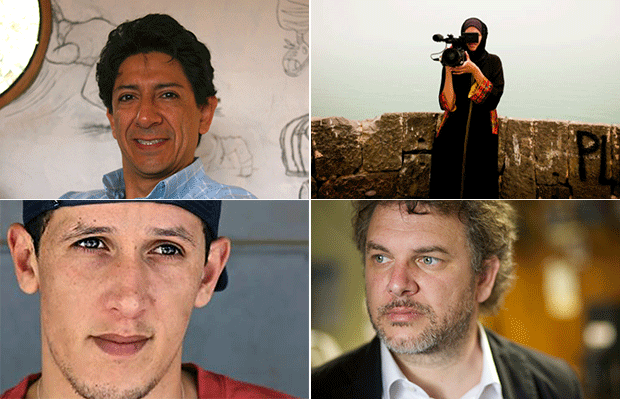
From top left: Xavier “Bonil” Bonilla, Safa Al Ahmad, Mouad “El Haqed” Belghouat and Lirio Abbate are among the Index Freedom of Expression Awards nominees for 2015.
A journalist under 24-hour protection because of his reports into the Italian mafia, an Ecuadorian cartoonist facing prosecution for mocking a congressmen’s pay packet, and lawyers who challenged Turkey – and won – over its social media ban, are among those shortlisted for the Index on Censorship Freedom of Expression Awards this year.
Drawn from more than 2,000 nominations, the shortlist celebrates those at the forefront of tackling censorship and threats to freedom of expression. Many of the 17 shortlisted nominees are regularly targeted by authorities or by criminal and extremist groups for their work: some face regular death threats, others criminal prosecution.
“The Index Freedom of Expression Awards recognise some of the world’s most courageous journalists, artists and campaigners,” said Jodie Ginsberg, CEO of Index. “These individuals and groups often work in isolation, with little funding or support, but they are all driven by the vision of a world in which everyone can express themselves freely – no matter who they are or what they believe.”
Awards are offered in four categories: journalism, arts, campaigning and digital activism.
Those on the shortlist include Lirio Abbate, an Italian journalist whose investigations into the mafia mean he requires constant protection; Safa Al Ahmad, whose documentary exposed details of an unreported mass uprising in Saudi Arabia; radio station Echo of Moscow, one of Russia’s last remaining independent media outlets; and Rafael Marques de Morais, an Angolan reporter repeatedly prosecuted for his work exposing government and industry corruption.
Arts nominees include Ecuador’s censored cartoonist Xavier “Bonil” Bonilla – who has for more than 30 years critiqued and lampooned the country’s authorities; Moroccan rapper Mouad “El Haqed” Belghouat, whose music challenges poverty and government corruption; Rory “Panti Bliss” O’Neill, a Dublin-based drag artist who speaks out against homophobia; and Malian musicians Songhoy Blues, who fled their country after music was banned. Guitarist Garba Touré was threatened with having his hand cut off.
In the campaigning category, nominees range from lawyers Yaman Akdeniz and Kerem Altiparmak, who played a key part in overturning Turkey’s social media ban last year; to innovative German anti-Nazi group ZDK; to Amran Abdundi, working on the treacherous Somali-Kenya border to help women and girls who are frequently victims of violence, rape and murder. They also include Abdul Mujeeb Khalvatgar who is working to develop a free media in Afghanistan, and The Union of the Committee of Soliders’ Mothers of Russia – a group dedicated to exposing stories of Russian soldiers, killed in the Ukraine conflict, which the Russian government denies.
The digital activism category, which is decided by public vote, includes investigative news outlet Atlatszo.hu, which is using freedom of information requests to hold the Hungarian government to account; Nico Sell, a US-based entrepreneur and online privacy activist; online map Syria Tracker, which is providing reliable data on human rights abuses in Syria; and Valor por Tamalipas, a crowd-sourced news platform set up to fill a void created by the region’s drug cartel-induced media blackout.
The shortlisted nominees:
Arts
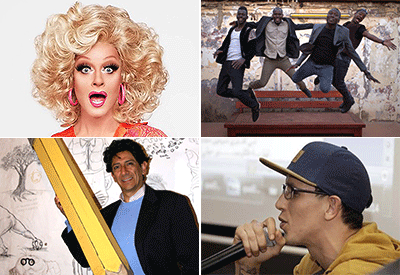
Panti Bliss (Ireland)
Songhoy Blues (Mali)
“Bonil” (Ecuador)
“El Haqed” (Morocco)
More details
Campaigning
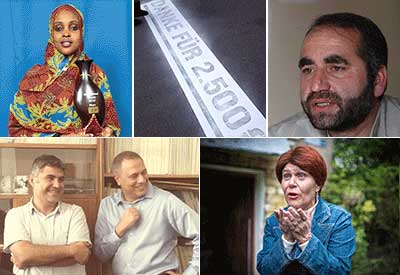
Amran Abdundi (Kenya/Somalia)
Zentrum Demokratische Kultur (Germany)
Abdul Mujeeb Khalvatgar (Afghanistan)
Yaman Akdeniz and Kerem Altiparmak (Turkey)
Soldiers’ Mothers (Russia)
More details
Digital Activism

Syria Tracker (Syria)
Nico Sell (USA)
Atlatszo.hu and Tamás Bodoky (Hungary)
Valor por Tamaulipas (Mexico)
More details
Journalism
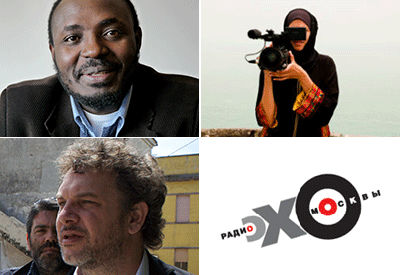
Rafael Marques de Morais (Angola)
Safa Al Ahmad (Saudi Arabia)
Lirio Abbate (Italy)
Echo of Moscow (Russia)
More details
This article was posted on 27 January 2015 at indexoncensorship.org